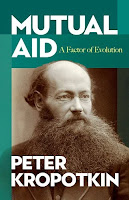What is Mutual Aid?
What is Mutual Aid? The Power of Community Support & Solidarity
Mutual aid works through people coming together, sharing what they have, whether time, resources, or care, without waiting for permission from institutions or depending on traditional charities. It’s grounded in solidarity, not a giver & receiver relationship. Everyone involved plays a part, & the effort centers on equality, not charity. Covering a neighbor’s rent or sharing a meal can have a bigger impact than donating to a millionaire's campaign or a big-name charity.
Mutual aid begins within the community, shaped by the needs of those who live there. Neighbors take care of one another through offering rides, sharing meals, or helping with childcare. The core idea stays simple: everyone has something to offer, & when people work together, the whole community grows stronger.
The effects reach beyond meeting immediate needs. Mutual aid builds genuine connections, trust, & shared responsibility. It’s not about handing down help, it’s about standing together, each person contributing to the collective well-being.
When institutions fail to provide, mutual aid steps in. It allows communities to care for their own in direct, lasting ways, filling the gaps left by systems that often overlook those most in need.
Articles on Mutual Aid
Here are some articles that explore Mutual Aid in greater depth:
“Solidarity, Not Charity: Mutual Aid’s An-archic History” - This article explores the distinction between mutual aid & charity, emphasizing how mutual aid is rooted in solidarity & direct community support rather than hierarchical assistance. It highlights the historical & contemporary relevance of mutual aid in social movements.
“Mutual Aid Is Essential to Our Survival Regardless of Who Is in the White House” - Published by Truthout, this piece discusses the enduring importance of mutual aid in various activist movements, particularly within Black & Indigenous communities. It emphasizes mutual aid as a crucial element in building resilient & self-sustaining communities.
“Dean Spade on How Mutual Aid Will Help Us Survive Disaster” - In this article from In These Times, Dean Spade provides a comprehensive look at how mutual aid can be a powerful tool for community survival & resilience, especially in the face of disasters. The article also discusses the intersectionality of mutual aid efforts.
“What Is Mutual Aid (And How Can It Build Power)” - This Current Affairs article breaks down the fundamental aspects of mutual aid, contrasting it with charity & explaining how it builds power within communities. It also provides practical insights into organizing mutual aid efforts effectively.
“Mutual Aid Proves Essential to Organizing Work” - This piece from Giving Compass highlights the critical role mutual aid plays in movements like StopCopCity & climate justice activism. It discusses how mutual aid fosters economic solidarity & supports broader social movements.
Books on Mutual Aid
If you’d like to dive further, below are some books to consider. The books link out to our Bookshop, we recommend Thrift Books, & if you need to, Amazon - these affiliate links support our work at no extra cost to you. ❤
“Mutual Aid: A Factor of Evolution” by Peter Kropotkin — A foundational text that explores the role of cooperation in human & animal evolution, challenging the notion of survival of the fittest.
“Mutual Aid: Building Solidarity During This Crisis (and the Next)” by Dean Spade — This book is essential for understanding how mutual aid operates in modern contexts, particularly during crises like the COVID-19 pandemic. It provides actionable strategies for organizing mutual aid efforts, emphasizing solidarity, direct action, & the importance of grassroots movements. You can read it for free at The Anarchist Library.
“Decolonizing Wealth: Indigenous Wisdom to Heal Divides and Restore Balance” by Edgar Villanueva — This book delves into how mutual aid & redistribution can address systemic inequalities, drawing on Indigenous wisdom & practices.
“Solidarity Economics: Why Mutuality and Movements Matter” by Chris Benner & Manuel Pastor — This book examines how mutual aid & solidarity economics can transform local communities & create sustainable, equitable economies.
Mutual aid shows the real power of people coming together to care for one another. It’s rooted in sharing, working collectively, & meeting needs in ways that build long-term strength. Beyond helping individuals, it brings people closer, creating connections that matter when times get hard. As social & economic challenges keep growing, mutual aid reminds us that real, lasting solutions come from the ground up, from people who choose to look out for each other.














Comments
Post a Comment